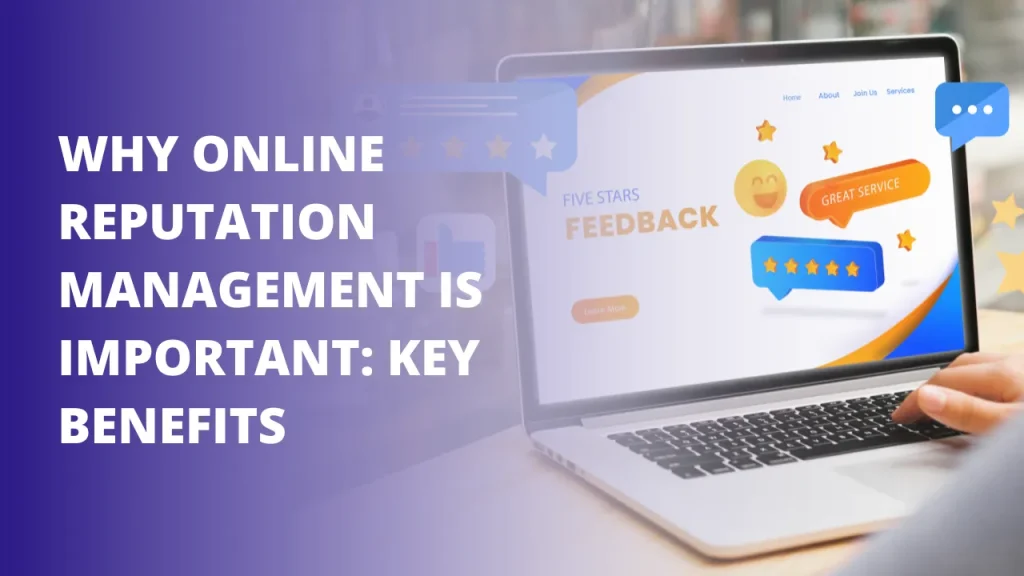In today’s digital age, a brand’s online reputation can make or break its success. With the increasing reliance on online platforms for business transactions and customer interactions, it has become crucial for companies to prioritize their online reputation management (ORM) strategies. Online reputation management involves monitoring, building, and maintaining a positive brand image across various digital channels, including search engines like Google, social media platforms, and review sites.
Effective ORM strategies not only help businesses protect their brand reputation but also offer numerous benefits that contribute to their overall growth and success. From improving customer experience and building trust to enhancing brand visibility and generating valuable insights, the importance of online reputation management cannot be overstated. In this article, we will delve into the key benefits of ORM and explore how businesses can leverage digital marketing services and SEO services to effectively manage their online reputation.
The Impact of Online Reputation on Business Success
A business’s online reputation has a profound impact on its success in today’s digital landscape. Studies show that 90% of customers read online reviews before visiting a business, and 59% of shoppers perform online research before making a purchase. This highlights the crucial role that online reputation plays in attracting and retaining customers.
Positive online reviews and a strong reputation can:
- Boost sales by attracting more consumers
- Build trust and credibility among potential and existing customers
- Increase online visibility and ranking on search engines and social media platforms
- Foster customer loyalty, leading to repeat business and a steady stream of revenue
- Act as a form of organic advertising, drawing in customers through positive word-of-mouth and high ratings.
On the other hand, negative reviews and a poor online reputation can deter potential customers, causing them to choose competitors with better reviews. In fact, each star in a rating on review platforms like Yelp could potentially increase a business’s revenue by up to 9%. Moreover, negative online content can sometimes lead to legal and financial repercussions, which ORM helps identify and address.
Key Strategies for Effective Online Reputation Management
Effective online reputation management involves a combination of proactive strategies and timely responses to maintain a positive brand image. Some key strategies include:
Monitor online presence regularly:
- Set up alerts using tools like Google Alerts or Talkwalker to track mentions of your brand across various platforms.
- Regularly check reviews on major platforms such as Google, Yelp, and Facebook.
Engage proactively with your audience:
- Respond promptly and professionally to reviews, comments, and messages, showing your commitment to customer satisfaction.
- Address negative feedback empathetically and offer solutions to resolve issues.
- Encourage satisfied customers to leave positive reviews and testimonials.
Develop a strong content marketing strategy:
- Create quality content around branded keywords to control the narrative around your brand.
- Share your values, mission, and unique selling propositions authentically across digital channels.
- Collaborate with relevant influencers and media outlets to expand your reach and credibility.
Establish a crisis management plan:
- Outline an internal communication plan and assign team members to handle public responses.
- Address potential crises swiftly and thoughtfully to mitigate damage and regain trust.
Maintain consistent branding and accurate information:
- Ensure all content reflects your desired brand identity.
- Regularly update contact information on websites, social media pages, and business listings to increase visibility and accuracy.
By implementing these strategies, businesses can proactively manage their online reputation, build trust among customers, and establish themselves as industry leaders. Investing in online reputation management services can help companies monitor their online presence, address negative feedback, showcase positive content, and ultimately safeguard their brand image in today’s digital landscape.
Leverage the expertise of Codevelop’s Digital Marketing Services to effectively manage your online reputation and drive business success.
The Role of Social Media in Shaping Online Reputation
Social media platforms have become powerful tools for individuals and businesses to connect with their audience, showcase their expertise, and build their online reputation. By sharing valuable content, engaging in discussions, and demonstrating their skills and accomplishments, users can establish themselves as thought leaders in their industry. However, social media can also have negative consequences if not used responsibly.
It is crucial for individuals to be mindful of what they share on social media, ensuring that their content aligns with their personal and professional values. Revealing sensitive or controversial information about one’s personal life can lead to negative judgments from others, potentially affecting their professional life. Additionally, engaging in trolling, cyberbullying, or heated arguments can damage users’ online reputation and even have legal consequences.
For businesses, social media platforms offer a two-way communication channel where engagement is key to enhancing customer relationships. These platforms serve as arenas for public conversation and opinion formation, making them vital components of online reputation management. However, it is essential to monitor social media for customer complaints and negative mentions, as these can significantly impact a business’s online reputation if not addressed promptly and professionally.
Online Reputation Management Tools and Software
Online reputation management tools and software play a crucial role in helping businesses monitor, analyze, and manage their online presence effectively. These tools offer a range of features, including sentiment analysis, social media monitoring, review management, and brand mention tracking.
Some popular online reputation management tools include:
- Semrush: Offers a suite of tools like Social Inbox, Media Monitoring, and Brand Monitoring to manage customer interactions, track brand mentions, and analyze sentiment.
- Statusbrew: Provides a single dashboard to monitor social and review channels, AI sentiment analysis, and automation features for comment moderation and review management.
- Reputation.com: Offers a unified dashboard, reputation score, and machine learning-based AI for tailored recommendations.
- Podium: Helps acquire and manage reviews, uses text messaging to encourage customer reviews, and provides detailed analytics.
- Birdeye: An AI-powered platform that helps manage online reputation, builds customer relationships, and offers multiple ways to reach out for reviews.
These tools enable businesses to efficiently monitor their online reputation, respond to customer feedback, and take proactive measures to maintain a positive brand image. By leveraging the power of AI, automation, and data-driven insights, businesses can effectively manage their online reputation and build strong customer relationships.
Overcoming Challenges in Online Reputation Management
While online reputation management offers numerous benefits, businesses may face several challenges when implementing ORM strategies. One of the most common challenges is dealing with negative reviews and customer complaints. It is essential to develop a strategy for timely and appropriate responses to these issues, as they can significantly impact a brand’s reputation. Training your team to handle online interactions in a way that aligns with your brand’s values and messaging is crucial to maintaining a positive online presence.
Another challenge is the spread of fake news and misinformation, which can harm a brand’s reputation by creating confusion, distrust, and controversy among the audience and stakeholders. To combat this, businesses should monitor online channels regularly and address any misinformation swiftly and factually. Additionally, creating clear policies on what information can be shared publicly and what should remain confidential can help prevent potential reputation issues.
Conclusion
In today’s digital landscape, online reputation management has become a critical aspect of business success. By monitoring, building, and maintaining a positive brand image across various digital channels, businesses can improve customer experience, build trust, enhance brand visibility, and generate valuable insights. Implementing effective ORM strategies, such as proactively engaging with audiences, developing strong content marketing, and establishing crisis management plans, can help businesses safeguard their online reputation and drive growth.
As businesses navigate the challenges of online reputation management, leveraging the expertise of professional services can prove invaluable. Codevelop’s SEO services and Digital Marketing Services offer comprehensive solutions to effectively manage your online reputation and achieve your business objectives. By partnering with experienced professionals, you can harness the power of digital channels to build a strong, positive online presence that resonates with your target audience and propels your business to new heights of success.
FAQs
What is the significance of being conscious of your online reputation?
Being conscious of your online reputation is crucial because it reflects the collective perception of you or your business based on online content and opinions. A favorable online reputation can draw in new customers, foster trust and credibility, and enhance the overall image of your brand.
What are the advantages of managing your online reputation?
Managing your online reputation is essential as it can help you attract high-quality customers. When your online presence showcases professionalism, responsiveness, and attentiveness, it signals to potential customers that you are reliable. This can lead to attracting customers who are prompt with payments and trust in your ability to meet their needs.
How does maintaining a trustworthy and professional online reputation benefit you?
Maintaining a trustworthy and professional online reputation brings numerous benefits, such as increased trust and credibility, an improved brand image, stronger customer relationships, higher conversion rates, and a competitive advantage. Positive online reviews and feedback can lead to more customer interest, contributing to the growth and success of your business.
What is the primary objective of online reputation management?
The primary objective of online reputation management is to create and sustain a positive online presence for a business. This task is typically carried out by an online reputation management specialist who strategically works to enhance and protect the business’s reputation on the Internet.
About Codevelop
Are you having trouble navigating the world of web design and development? Look no further! Our team of dedicated professionals in Portland, Oregon excels at crafting user-friendly websites and intuitive mobile apps to elevate your brand. We offer impressive website revamps, engaging apps, and effective SEO and digital marketing tactics to enhance your online visibility. At CoDevelop.us, we value collaboration with our clients to realize their goals, with a focus on their success. Reach out to us today to learn more about our services and start discussing your project!


